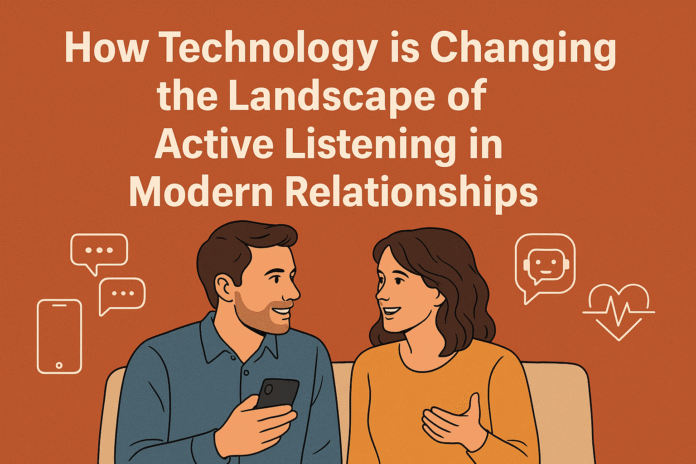Because technology changes so quickly, the way we talk to and connect with each other has changed a lot. These changes have also affected active listening, which is a key skill for maintaining good relationships. Technology is transforming how we give, obtain, and comprehend attention in our relationships today. For example, smartphones and AI-powered chatbots are making it tougher to focus. This article talks about how technology can help or damage those who are trying to listen. We talk about how digital communication is changing, how AI companions are becoming more common, and the best methods to stay connected with people in a world that is getting more virtual. We do this by looking at the most recent studies and real-life situations.
1. How technology for communication has changed throughout time
In the last 20 years, we’ve gone from chatting to people in person and on the phone to using AI-powered assistants, instant messaging, and video conversations. Here are some important things that happened:
- Smartphones and Instant Messaging
It was tougher to distinguish the distinction between business and personal time when you could communicate to people on your phone or through apps like WhatsApp and WeChat. These platforms are useful, but they can also make people less interested in messaging and more exhausted because they feel like they have to do more than one thing at a time. - Video Conferencing
Video conferencing platforms like Microsoft Teams and Zoom have made it feasible for family, friends, and partners to “meet” in person no matter where they are. It can be harder to genuinely listen when you can’t see body language in person and you have “Zoom fatigue.” - Short-Form Social Media
Instagram and TikTok are two social media services that are all about short, visual stories. Their feeds, which are based on algorithms, can make partners lose focus when they’re talking, which can cause “phubbing” or phone-snubbing behavior in partnerships.
2. Things that help you stay focused
Using technology on purpose can help you listen actively, even though it can be hard:
- AI Friends and Bots That Talk
People like AI companions like ChatGPT, Replika, and Character, according to research. AI is becoming more and more like a digital companion for those who need help and assistance. A study by Common Sense Media indicated that 70% of teens have used AI friends. 31% thought they were just as good as chatting to people. AI can’t replace human empathy, but smart speakers that use backchanneling tactics like “I see” and “Tell me more” have been demonstrated to make individuals feel more supported and inclined to chat. - Seeing Emotions Right Now
By seeing at your partner’s face and listening to their voice, new apps can identify whether they might be upset or not interested. These features assist individuals have deeper conversations by reminding them to check in at the opportune time, like “It looks like you’re stressed; are you okay?” - Apps for Listening with Focus
Apps like PAIRS Yodi use EQ activities and prompts to help couples practice reflective listening, which helps them understand each other better over time.
3. The advantages of combining technology and active listening
When used appropriately, technology can be tremendously helpful:
- 24/7 Availability
AI friends are constantly available for you and are easy to get in touch with. They give you a reliable way to develop your listening skills or get people to understand how you feel. This is incredibly useful for people who are busy or who are in long-distance relationships. - Personalized Feedback
Advanced Natural Language Processing (NLP) might offer strategies to get better, such not using language that interrupts or better understanding how your partner feels by paying attention to tone, tempo, and word choice. - Skill-Building Modules
People can learn how to listen better outside of high-pressure conversations by playing interactive games and modules that teach them how to paraphrase and ask open-ended questions.
4. Problems and risks
Not all technology is healthy for you. Some of the most harmful items are:
- Distraction and Phubbing
When you spend too much time on your phone or other devices when you’re with others, they are less happy and trust you. Research shows that 25% of married couples and 42% of unmarried couples report that partner phubbing is a big source of stress for them. It leads to less connection and more fighting. - Privacy Concerns
Apps that read private messages make users worried about their data privacy. Sensitive emotional information could be stored, exchanged, or used in the wrong way if there isn’t robust encryption and clear regulations. - Emotional Dependence on AI
AI can act like it cares, but if you use it too much, it can make it difficult to learn how to talk to people in real life. Experts agree that AI shouldn’t replace human interactions; instead, it should work with them to help people feel less alone. - Misreading Digital Cues
It’s easy to get the tone wrong when you only read words and don’t see any body language. “Read receipts” and typing indicators can make individuals uneasy, which makes them think too much instead of genuinely listening.
5. The best methods to use technology to help you pay attention
Here are some tips for making the most of technology while avoiding its problems:
- Be clear about your limits
- Set aside time for “tech-free” events, like supper or bedtime, when you can listen without being bothered.
- You should only use “Do Not Disturb” modes for urgent calls from family and friends.
- Use tools that help you comprehend other people
- Tell messaging applications when your partner is sad and provide them ideas for how to show you care.
- Using shared notebooks or voice notes, partners can think about and go back to conversations at their own pace.
- Show folks how to be kind online
- Set rules for how long it should take to respond. You don’t always need or anticipate a quick answer.
- To avoid confusion, make sure everyone knows what reaction emojis or voice memos represent.
- Check your apps’ permissions often
- To keep your data safe, make sure that your communication apps obey the GDPR or CCPA.
- You should only delete or archive communication logs that you need to maintain your privacy.
- Use technology and talk to people in person at the same time
- After talking online, make plans to meet in person or have a video conversation to work on your verbal and nonverbal listening abilities.
- Use technology to plan events that bring people together, such digital vision boards, streaming viewing parties, or playlists that everyone can listen to.
Questions and Answers
Q1: Can AI actually figure out how people feel when they talk?
A: AI has come a long way in sentiment analysis; it can find keywords, tone, and pauses. But it doesn’t comprehend context as well as people do. Researchers have shown that AI companions may express empathy by saying things like “I understand,” which makes individuals feel more supported. However, they should not take the place of actual human connection.
Q2: What are the greatest applications for helping you learn how to listen actively?
A: Here are some of the better options:
- Replika: You can be friends with an AI, and it makes you think.
- PAIRS Yodi: Helps people learn how to be emotionally wise in their relationships.
- Voice-Analysis Apps: This application captures and analyzes voice chats, pointing out empty phrases and timing to help you improve.
Q3: What can we do to stop phubbing in our relationship?
A: Have tech-free date nights, make “phone baskets” for meals, and agree on times when you’ll reply. Talk about how it makes you feel when your partner doesn’t pay attention to you to make sure they are accountable.
Q4: Do video calls help you stay focused?
A: Video calls catch up on more nonverbal cues than text, so it’s easier to observe facial expressions and keep eye contact. On the other hand, “zoom fatigue” can make your brain work too hard. Short sessions (less than 30 minutes) can help you stay on task.
Q5: How can I protect my privacy when I use apps that let me listen?
A: Always:
- Look at the privacy policies for the apps.
- Choose encryption that lasts all the way through.
- People should only be able to use the camera and microphone when they are in a session.
- Regularly delete records of private chats.
Conclusion
As technology gets better, it gives us both new tools and new issues to deal with when we listen to each other in relationships. In this world, you need to be careful and make informed choices. There are AI companions who will always be there for you, but there are also risks like phubbing and data breaches. Couples can utilize technology to make their relationships better instead of worse by employing empathy-first features, creating digital boundaries, and integrating digital tools with real-life interactions. We can be confident that technology will bring us closer together instead of keeping us apart if we follow the EEAT standards when we send and read digital messages.
References
- AP News. “Teens say they are turning to AI for friendship.” July 23, 2025. AP News
- Business Insider. “5 ways teens are using AI companions, from flirting to serious advice.” July 22, 2025. Business Insider
- Wikipedia. “Phubbing.” Accessed July 27, 2025. Wikipedia
- Cho, E., Motalebi, N., Sundar, S. S., & Abdullah, S. “Alexa as an Active Listener: How Backchanneling Can Elicit Self-Disclosure and Promote User Experience.” arXiv preprint arXiv:2204.10191 (2022). arXiv
- Fatherhood Channel. “Technology is Transforming Modern Love.” July 6, 2024. Fatherhood Channel
- Care Clinics. “The Impact of Technology on Modern Relationships.” Accessed July 2025. Care Counseling MN




































